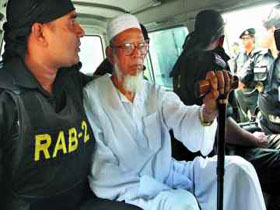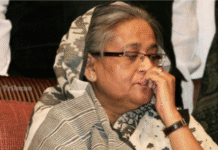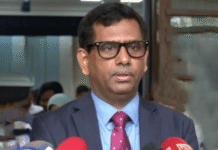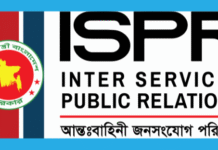“Razakars had perpetrated the systematic killing of Hindus at Sakharighati village of Bagerhat during the Liberation War in which my converted Muslim husband was also a victim of the massacre,” said Ullashini Das as prosecution witness No. 26 while facing cross-examination before the International Crimes Tribunal -2 on Sunday.
“So far I recall, it was on 18th of Bangla month Kartik, a Friday,” added the septuagenarian witness, expressing her ignorance about English calendar.
Replying to a defence question, Ullashini said: “After being forcibly converted as a Muslim by Razakar to save his life, my husband Mahadev Chandra Das had turned a bearded man with cap on his head and used to offer prayers at the mosque… I can’t remember the Muslim names of myself and my slain husband.”
During the cross–examination by defence counsel Mizanul Islam, the PW told the three-member tribunal headed by Justice Obaidul Hassan that she had never seen and heard the name of ‘major of Razakar ‘AKM Yusuf before the horrendous incident in 1971.
Earlier, while making testimony against war crimes accused Maulana AKM Yusuf, senior nayeb-e-ameer of Jamaat-e-Islami, Ullashini told the tribunal that in the Bangla month of Sraban during the Liberation War, a group of Razakar entered Shakharighati village a couple of days ago before the villagers had been converted into Muslim from Hindu.
The Razakars had launched a campaign persuading the villagers to get ready for converting into Muslim from Hindu in a bid to save their lives, she said.
Ullashini said that on the day of conversion, Razakars herded the villagers to the house of Dr Sanatan under duress and she along with her husband and children also followed the villagers. In all, about 200-300 Hindus were present, she added.
“Razakars converted us into Muslim, taught us some Islamic verses and changed our names in line of Islamic tradition while the male villagers were given caps to wear on their heads,” said the PW.
The conversion ceremony was followed by lunch, served with beef managed from snatching two cows owned by Dr Sanatan, said Ullashini, adding that Razakars had compelled the newly-converted Muslims to take beef.
“During the lunch, I came to know that ‘Razakar major’ Maulana Yusuf assured us security for being Muslim,” she said.
Ullashini told the tribunal that at one stage during the luncheon, Razakars torched the haystack on the premises of Dr Sanatan, and seeing the flames people started to flee leaving their food.
On the 18th of Bangla month Kartik during the Liberation War, Razakars swooped on Shakharighati village, said the PW, adding that after sealing the three roads leading towards the village, Razakars had carried out systematic killings in the bazar area during which her converted husband was killed.
“I heard many gunshots like puffed rice bursting noisily during its preparation,” she recalled .
“Later, I found my bullet-riddled husband from among other bodies hit by bullets lying scattered on the ground,” said Ullashini, adding that her husband who received severe bullet wounds later died at her house.
“I could not observe any funeral rite for my husband and his body was simply dumped in the nearby river,” she said amid sobbing.
Ullashini told the tribunal that after the horrific carnage, she came to know the local people talking among them that Maulana Yusuf had destroyed the country by instigating atrocities.
As the testimony and cross-examination of Ullashini was over, the prosecution, following the tribunal’s objection, could not put in the witness box its listed corroborating witness PW-27 Suchitra, daughter of Ullashini, who now lives in India with her husband.
Agreeing with the tribunal, prosecutor Syed Haider Ali refrained from pressing the witness for deposition.
The tribunal adjourned for Monday.
On August 1 last year, the tribunal indicted Yusuf, senior nayeb-e-ameer of Jamaat-e-Islami, for his involvement in crimes against humanity during the 1971 Liberation War.
The tribunal considered 13 out of 15 charges of crimes against humanity during the 1971 Liberation War as proposed by the prosecution on May 8 last year which fall under sections 3(2), 4 (1) and 4 (2) of the International Crimes (Tribunals) Act 1973.
Founder of the notorious Razakar outfit during the 1971 Liberation War, Yusuf, also the second man in the hierarchy of Jamaat leadership, faces charges, including genocide, killing, loot, arson, deportation of people and religious conversion.
According to the prosecution, Jamaat leader Yusuf, a member of the infamous Malek cabinet in occupied Bangladesh, a rubberstamp government backed by the Pakistan junta, had formed for the first time in Khulna in 1971 the vigilante group Razakar with the members of Jamaat-e-Islami that acted as an auxiliary force of the Pakistan occupation army to actively thwart the Bangladesh liberation forces.
Yusuf had also acted as the chairman of the Peace Committee (Collaborator) in Bagerhat, Satkhira and Khulna districts during the Liberation War.
Source: UNBConnect










